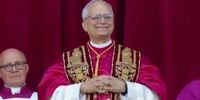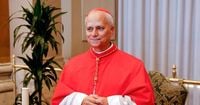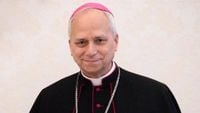On May 8, 2025, the Vatican confirmed the election of Cardinal Robert Francis Prevost as the new Pope, marking a historic moment as he becomes the first pontiff born in the United States. The announcement was made with the traditional white smoke emerging from the Sistine Chapel at 18:08 hours, signaling the conclusion of the conclave held by 133 cardinal electors.
Cardinal protodeacon Dominique Mamberti declared Prevost as the 267th Pope, who will take the name Leo XIV. The election was celebrated by thousands gathered in St. Peter's Square, who erupted in applause and cheers as the news spread. Prevost, 69, has spent a significant part of his life in Peru, where he served as a missionary and later as the Archbishop of Chiclayo.
Born in Chicago in 1955, Prevost's journey to the papacy is notable not only for his American roots but also for his deep ties to Latin America, having obtained Peruvian nationality in 2015. His election represents a shift towards a more global perspective within the Vatican, especially as the Catholic Church navigates internal divisions.
Prevost's reputation as a moderate and a bridge-builder has been highlighted by religious analysts and international media. The Italian newspaper La Repubblica described him as "the least American of Americans" due to his balanced approach and ability to avoid polarization. This quality is particularly crucial during a time when the Church grapples with the legacy of Pope Francis, who also hailed from Latin America and initiated several reforms.
Having arrived in Peru in 1985 as an Augustinian missionary, Prevost dedicated nearly three decades to various communities before being appointed apostolic administrator of Chiclayo in 2014 by Pope Francis. He later became the prefect of the Dicastery for Bishops, a key Vatican office responsible for recommending episcopal appointments. Additionally, he chaired the Pontifical Commission for Latin America, further solidifying his connection to the region.
With his extensive background, Prevost faces significant challenges as he steps into the papacy. In an interview with Vatican News, he acknowledged that there is still "much to do" in the ongoing transformation of the Church. He emphasized that the Church cannot afford to stagnate: "We cannot stop, we cannot go back. We need to see how the Holy Spirit wants the Church to be today and tomorrow... the world is not the same as it was 10 or 20 years ago."
Prevost's academic credentials are impressive. He holds a Doctorate in Canon Law and studied in Rome after graduating with a degree in Mathematics from Villanova University. His legal expertise has garnered respect even from more conservative factions within the Church.
Throughout his career, Prevost has been a vocal advocate for addressing contemporary issues such as climate change and the need for the Church to engage with the marginalized. He has expressed the necessity of adapting the Church's outreach to resonate with younger generations and the politically active, reflecting on the importance of proclaiming the Christian message in a manner suited to today's society.
Prevost's election comes at a time when the Catholic Church is at a crossroads, facing both internal strife and external pressures. His prior experience as a close collaborator of Pope Francis positions him uniquely to continue the legacy of reform while also addressing the concerns of those who may resist change.
As he embarks on this new journey, Prevost has already begun to articulate his vision for the Church. His first public address as Pope will be closely watched, as he aims to unite a diverse and often divided congregation. His call for peace and service to the poor was evident in his remarks following the announcement of his election.
In his inaugural speech, Prevost thanked Pope Francis for his legacy and extended a message to the world, emphasizing the importance of solidarity among all peoples. His approach to leadership promises to be characterized by humility and a commitment to pastoral care.
As the first American Pope, Prevost's ascension is not just a personal achievement but a significant milestone for the Church, which has historically seen limited representation from the United States at such high levels. His election could reshape perceptions of the papacy and inspire a new generation of leaders within the Church.
Prevost's journey from a missionary in Peru to the papacy is a testament to his dedication and service. His ability to connect with the faithful, particularly in Latin America, will be essential as he navigates the complexities of leadership in a globalized world.
In the coming months, the Catholic Church will be watching closely to see how Pope Leo XIV addresses the pressing issues of our time, including social justice, environmental concerns, and the Church's role in a rapidly changing society.



